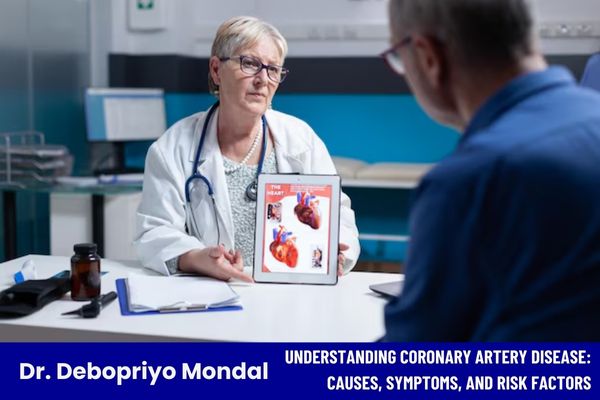Understanding Coronary Artery Disease: Causes, Symptoms, and Risk Factors with Dr. Debopriyo Mandal
Coronary artery disease (CAD) is one of the most common causes of heart disease worldwide, and it can lead to serious complications, including heart attacks and heart failure. Understanding the causes, symptoms, and risk factors associated with CAD is crucial for early detection and effective management. In this blog, Dr. Debopriyo Mandal, an expert cardiologist, explains the key aspects of coronary artery disease and how you can reduce your risk and protect your heart.
What is Coronary Artery Disease?
Coronary artery disease refers to the condition in which the coronary arteries, responsible for supplying oxygen-rich blood to the heart muscle, become narrowed or blocked. This happens due to a buildup of fatty deposits, known as plaque, in the arteries. Over time, plaque accumulation causes the blood vessels to harden and restrict blood flow, leading to various heart-related issues.
CAD is often asymptomatic in its early stages, but as the condition progresses, it can cause chest pain (angina), shortness of breath, and even heart attacks.
Causes of Coronary Artery Disease
Dr. Debopriyo Mandal explains that the primary cause of coronary artery disease is the process of atherosclerosis, which involves the accumulation of plaque in the coronary arteries. Several factors can contribute to atherosclerosis and increase the risk of CAD:
- High Cholesterol: Elevated levels of LDL (low-density lipoprotein) cholesterol, commonly referred to as “bad cholesterol,” can lead to plaque buildup in the arteries.
- High Blood Pressure: Hypertension (high blood pressure) can damage the blood vessel walls, making them more susceptible to plaque formation.
- Smoking: Smoking increases the formation of plaque by damaging the lining of the blood vessels and reducing the oxygen levels in the blood.
- Unhealthy Diet: A diet rich in saturated fats, trans fats, and cholesterol can contribute to the development of plaque in the coronary arteries.
- Lack of Exercise: Physical inactivity is associated with obesity, high blood pressure, and poor cholesterol levels, all of which increase the risk of CAD.
- Diabetes: Uncontrolled diabetes can damage blood vessels and accelerate plaque buildup, increasing the likelihood of CAD.
Symptoms of Coronary Artery Disease
In the early stages of coronary artery disease, there may be no noticeable symptoms. As the disease progresses and the coronary arteries become more narrowed or blocked, individuals may experience:
- Chest Pain (Angina): A feeling of tightness or pressure in the chest, which may spread to the arms, neck, or jaw. This pain is often triggered by physical exertion or emotional stress.
- Shortness of Breath: When the heart does not receive adequate blood flow, it can cause difficulty breathing, particularly during physical activity.
- Fatigue: Reduced blood flow to the heart muscle can result in feelings of tiredness, even with minimal exertion.
- Heart Palpitations: An irregular heartbeat can occur when the heart is struggling to pump blood efficiently due to CAD.
- Dizziness or Lightheadedness: Insufficient blood flow to the brain can cause fainting or dizziness.
If you experience any of these symptoms, it’s essential to seek medical attention promptly to prevent complications.
Risk Factors for Coronary Artery Disease
Dr. Mandal highlights several risk factors that increase the likelihood of developing coronary artery disease. While some of these factors are non-modifiable, many can be managed through lifestyle changes and medical intervention:
- Age: The risk of CAD increases with age. Men over 45 and women over 55 are at higher risk.
- Gender: Men are generally at greater risk at an earlier age, but the risk for women increases after menopause.
- Family History: A family history of heart disease can significantly increase the risk of developing CAD.
- High Blood Pressure (Hypertension): Chronic high blood pressure can damage the arteries, making them more prone to plaque buildup.
- High Cholesterol: Elevated cholesterol levels, particularly high LDL cholesterol, contribute to the formation of plaques in the arteries.
- Diabetes: Diabetes, especially when uncontrolled, increases the risk of CAD by damaging blood vessels and promoting plaque formation.
- Obesity: Being overweight or obese can lead to other risk factors like high blood pressure, high cholesterol, and diabetes.
Prevention and Management of Coronary Artery Disease
Dr. Debopriyo Mandal emphasizes that while some risk factors, like age and genetics, cannot be changed, there are several strategies to lower the risk and manage coronary artery disease effectively:
- Healthy Diet: A diet low in saturated fats, trans fats, and cholesterol can help reduce plaque buildup and lower cholesterol levels. Focus on eating heart-healthy foods like fruits, vegetables, whole grains, and lean proteins.
- Regular Exercise: Engaging in at least 30 minutes of moderate-intensity exercise most days of the week can help control blood pressure, cholesterol, and body weight.
- Quit Smoking: Stopping smoking is one of the most important steps to protect your heart and reduce the risk of CAD.
- Manage Stress: Chronic stress can negatively impact heart health, so practicing stress-relieving techniques such as meditation, deep breathing, or yoga can be beneficial.
- Medications: Depending on the severity of your condition, your doctor may prescribe medications to control cholesterol, blood pressure, and blood sugar levels. In some cases, procedures like angioplasty or coronary artery bypass surgery may be necessary to restore blood flow.
Conclusion
Coronary artery disease is a serious condition that can have life-threatening consequences if left untreated. Understanding its causes, symptoms, and risk factors is essential for early detection and effective management. With the right lifestyle changes, medical intervention, and regular monitoring, you can reduce your risk and take proactive steps toward maintaining heart health.
If you are at risk for coronary artery disease or are experiencing symptoms, don’t hesitate to schedule a consultation with Dr. Debopriyo Mandal for a comprehensive heart health evaluation.
